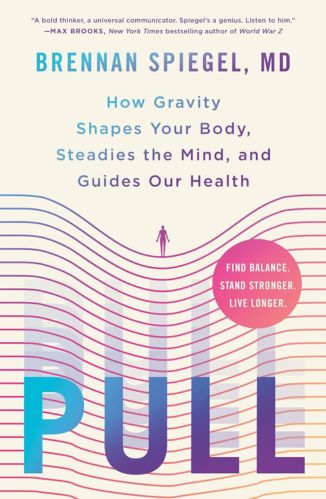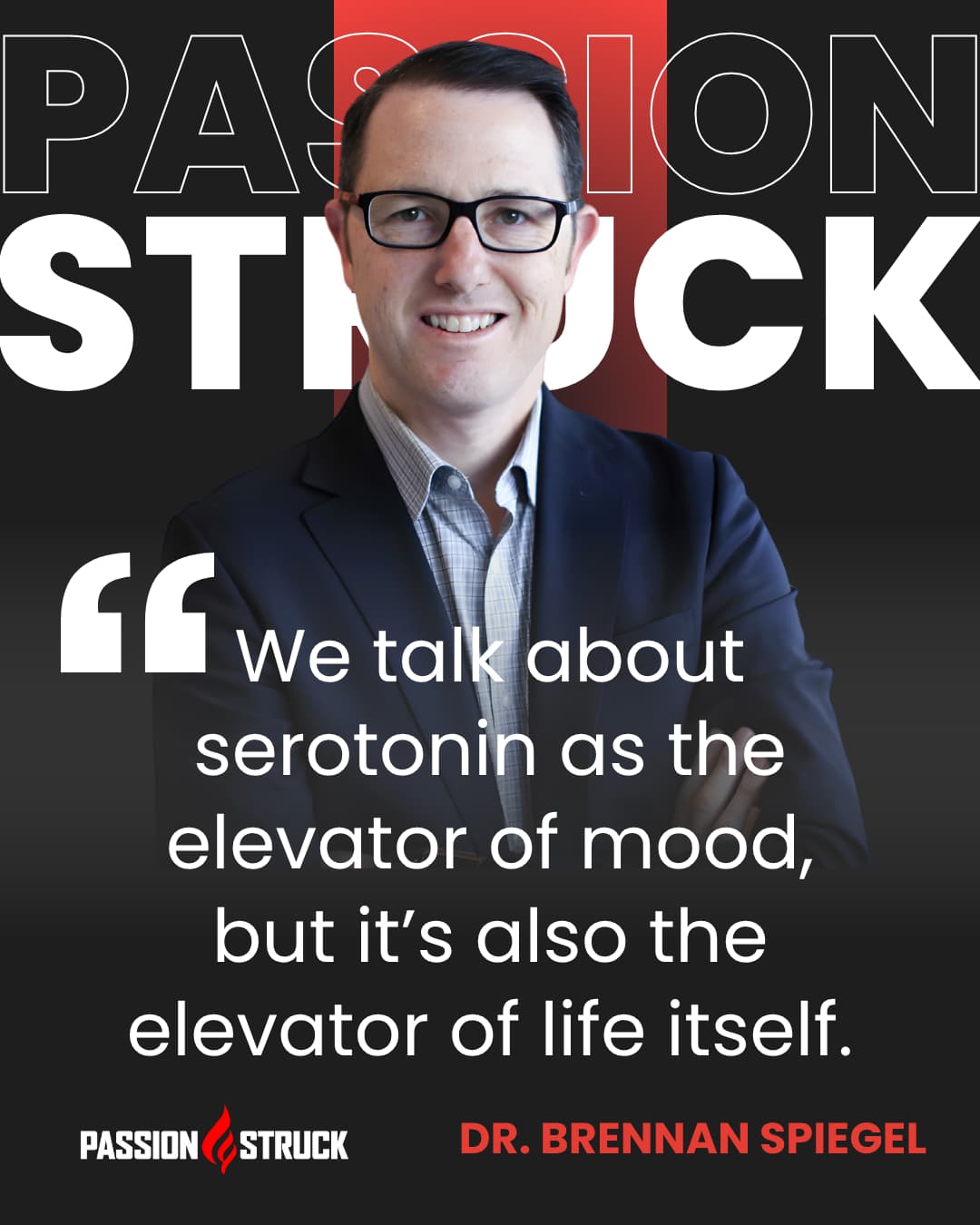What if one of your most powerful senses has been hiding in plain sight?
In this thought-provoking episode of the Passion Struck podcast, John R. Miles sits down with Dr. Brennan Spiegel, physician, professor at UCLA and Cedars-Sinai, and author of the groundbreaking book Pull: How Gravity Shapes Your Body, Steadies the Mind, and Guides Our Health. Together they explore graviception—the body’s hidden sense of gravity—and how this invisible force influences everything from our posture and gut health to our emotions, resilience, and overall well-being.
Dr. Spiegel is one of the world’s leading experts in digital health, virtual reality therapeutics, and the mind-body connection. His work bridges hard science with human experience, revealing how gravity, emotion, and biology are intertwined in ways most of us never consider. This conversation will change how you think about balance, strength, and the unseen forces that shape your life.
What Is Graviception?
Graviception is your body’s innate ability to sense and respond to gravity. It’s what allows you to balance on one foot, maintain posture, pump blood to your brain, and know instinctively where “up” and “down” are. It involves the vestibular system in the inner ear, the brain’s anterior insula, and countless physiological systems that evolved under Earth’s constant pull.
“Gravity came first. Biology came second,” Spiegel explains. Every cell, sinew, and organ in your body was designed to work in harmony with gravitational forces. Yet most of us rarely think about this fundamental relationship—or what happens when it falters.
Why This Matters
Most people think about diet, exercise, or stress management when they talk about health—but almost no one thinks about gravity. Yet every heartbeat, every breath, every emotional high and low happens under its constant influence.
Dr. Brennan Spiegel’s research reminds us that to thrive, we must strengthen our relationship with gravity itself. Building gravity resilience is not about defying nature—it’s about learning to move with it, balancing strength with awareness.
This episode invites you to reimagine wellness through a new lens—one that connects posture, emotion, and purpose. Whether you are an athlete, a clinician, or simply someone seeking better health, graviception offers a transformative way to understand how your body and mind stay aligned with the world beneath your feet.
Key Themes and Highlights
1. Gravity Intolerance and Common Conditions
Dr. Spiegel describes how many chronic symptoms—back pain, dizziness, ankle swelling, irritable bowel syndrome, or fatigue—can be signs of gravity intolerance. Our modern sedentary lifestyles weaken the very systems designed to resist gravity. Postural collapse compresses the intestines and reduces serotonin regulation, which can disrupt the gut microbiome and trigger anxiety or depression. Understanding gravity intolerance opens a new lens for healing.

2. The Gut-Brain-Gravity Connection
Over 95 percent of the body’s serotonin is produced in the gut. Spiegel calls serotonin a “gravity management substance” because it powers the internal “pumps and tubes” that keep us upright and balanced. Diet, movement, and posture directly affect how serotonin functions, linking physical strength with emotional stability.
3. Measuring Gravity Resilience
Your relationship with gravity can be measured in simple ways. Dr. Spiegel outlines several powerful indicators: one-legged balance, grip strength, dead hangs, heart rate variability, and vestibular function. These tests reveal not just physical fitness but overall vitality and longevity. As Spiegel explains, “Your ability to stand up to gravity predicts how long you’ll live.”
4. Emotional Gravity and Mental Health
Our language reflects an ancient truth. We feel “low” when sad and “uplifted” when happy. Depression feels heavy for a reason—it mimics the physical sensation of gravity pulling us down. The brain’s anterior insula and vestibular system integrate our sense of balance with emotion and selfhood. When these systems fall out of sync, we experience anxiety, derealization, and mood instability. By strengthening graviception—through balance training, yoga, or even virtual reality—we can literally reshape emotional states.
5. The Goldilocks Zone of Human Health
Both too little gravity (as in space) and too much (as in intolerance) harm the body. Astronauts lose bone density, microbiome diversity, and immune strength in microgravity. On Earth, those with poor posture or weak cores experience chronic stress under normal gravity. Dr. Spiegel calls this “the Goldilocks zone of human health”—where gravitational forces are “just right” and our systems operate in harmony.
6. Virtual Reality as a Tool for Healing
Dr. Spiegel’s lab at Cedars-Sinai is pioneering the use of virtual reality therapeutics to help patients manage pain, anxiety, and trauma. By simulating experiences of weightlessness or flight, VR can retrain the brain to respond differently to gravity and emotion. “When you change the physics of your reality,” he says, “you change the physiology of your body.”
Practical Takeaways

- Stand more often and vary your position throughout the day
- Strengthen your core to support the body’s internal suspension system
- Practice balance exercises such as yoga, Tai Chi, or single-leg stands
- Use inverted poses or gentle weight training to recalibrate graviception
- Consider tools like rucking or weighted vests to improve bone and metabolic health
- Cultivate emotional balance by paying attention to how “light” or “heavy” you feel in your body
RESOURCES FROM THE SHOW WITH DR. BRENNAN SPIEGEL
Please note that some of the links on this page (books, movies, music, etc.) lead to affiliate programs for which The Passion Struck podcast receives compensation. It’s just one of the ways we keep the lights on around here. Thank you so much for being so supportive!
- Dr. Brennan Spiegel’s All Socials & Resources HUB
- *Free companion tools on The Ignited Life (Substack): theignitedlife.net
- *Passion Struck Network: creator-first shows built around mattering, not metrics—passionstrucknetwork.com
- *Apparel with a message: StartMattering.com — “You Matter. Live Like It.”
About Today’s Guest, Brennan Spiegel

Dr. Brennan Spiegel is a physician, professor, and researcher at Cedars-Sinai and UCLA, where he directs Health Services Research and holds the George and Dorothy Gourrich Chair in Digital Health Ethics. He is the author of Pull: How Gravity Shapes Your Body, Steadies the Mind, and Guides Our Health and VRx: How Immersive Therapeutics Will Revolutionize Medicine.
A leading voice in digital health and virtual reality therapeutics, Dr. Spiegel explores how gravity, emotion, and the mind-body connection shape human health. His work bridges science and storytelling to reveal how technology and awareness can help us build resilience, balance, and well-being.
Next Steps
You can listen to this episode on Apple Podcasts, Spotify, Amazon Music, Google Podcasts, or YouTube. Don’t forget to explore our Passion Struck Starter Packs on Spotify for curated playlists that will help you dive deeper into topics like anxiety relief, resilience, and mental health mastery.
If this conversation with Sandy Yozipovic resonated with you, please share it with a friend, leave a review, or post a screenshot on Instagram and tag me @john_r_miles. Your support helps bring these life-changing conversations to more people who need them.
Stop existing. Start mattering.



